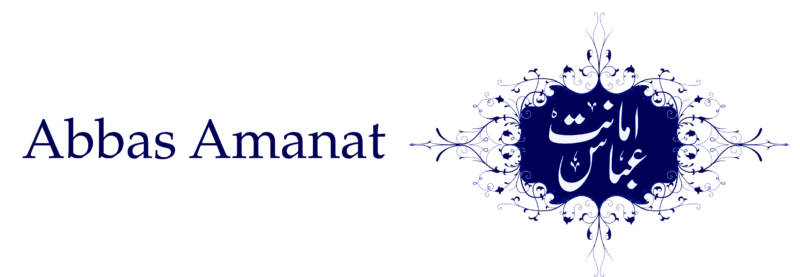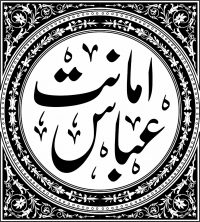Abbas Amanat is the William Graham Sumner Professor of History at Yale University and Director of the Yale Program in Iranian Studies.
Amanat is a graduate of Alborz High School. He received his BA from Tehran University in Social Sciences in 1971 and his DPhil from the Faculty of Oriental Studies, Oxford University in 1981. He studied with Albert Hourani and John Gurney as well as with Wilferd Madelung, Roger Owen, Hamid Enayat and Wilfred Knapp. The external examiner of his D.Phil. dissertation: “Emergence and Early Development of the Babi Movement, 1844–1850”, successfully defended in Hilary 1981, was K.S. Lambton. He later was appointed as a Fellow of St. Catherine’s College, Oxford (1981-1982).
Amanat began teaching first in the Program of Religious Studies at SUNY Stony Brook in 1982 and soon after was appointed as assistant professor in the Department of History, Yale University in the fall of 1983. As of 2020, he is Professor of History and Director of the Yale Program in Iranian Studies. Amanat is a historian of Iran, Shia Islam, and the modern Middle East. He specializes in Qajar Iran as well as in the history of messianic and apocalyptic movements in the Islamic world. Among other topics he has written about Iranian identity and changing attitudes among Iranians over time.[4] Amanat was a Carnegie Scholar of Islamic Studies (2005–2007) and the recipient of the Mellon-Sawyer Grant for comparative study of millennialism (1998–2001). He was the Editor-in-Chief of Iranian Studies, journal of the International Association for Iranian Studies (1991–98), and chair of the Council on Middle East Studies at Yale University (1993–2004).
Amanat is the Consulting Editor for Qajar History at the Encyclopædia Iranica. He is the author of 25 entries in the Encyclopædia Iranica on the history of the Qajar period, including: “Constitutional Revolution,” “Court and Courtiers: Qajar Period,” “Fath ‘Ali Shah Qajar,” “Great Britain: British Influence in Persia in the 19th Century,” “Historiography: Qajar Period,” “Historiography: Pahlavi Period,” “Islam in Iran: Messianic Movements,” and “Hajji Baba of Ispahan.’
Amanat has published numerous journal articles and contributed to volumes of essays. He also edited and co-edited several volumes including most recently with Assef Ashraf, The Persianate World: Rethinking A Shared Space, Leiden and Boston, Brill Publishers, 2018 and with Farzin Vejdani, Iran Facing Others: Identity Boundaries in Historical Perspective New York, Palgrave MacMillan, January 2012.
Abbas Amanat has taught and written about early modern and modern history of Iran, Muslim world, the Middle East and the Persianate world for more than three decades. His principal book publications include Iran: A Modern History (New Haven: Yale University Press, 2017); Az Tehran ta ‘Akka: Babiyan va Baha’iyan dar Asnad-e Dowran-e Qajar (From Tehran to ‘Akka: Babis and Baha’is in the Official Records of Qajar Iran, Copenhagen and New Haven: Ashkaar Publishers, 2016); Apocalyptic Islam and Iranian Shi’ism (London and New York: I B Tauris, 2009); Pivot of the Universe: Nasir al-Din Shah Qajar and the Iranian Monarchy, 1831-1896 (Berkeley and Los Angeles: University of California Press, 1997, paperback: London and New York: I B Tauris, 2008; Persian translation: Qebleh-e ‘Alam [Tehran: Nashr-e Karnameh, 2004]); Resurrection and Renewal: the Making of the Babi Movement in Iran, 1844-1850(Ithaca: Cornell University Press, 1989; second ed. Los Angeles: Kalimat Press, 2005).
Amanat has edited Crowning Anguish: Memoirs of a Persian Princess from the Harem to Modernity (Washington DC: Mage Publishers, 1995) and Cities and Trade: Consul Abbott on the Economy and Society of Iran (London: Ithaca Press, 1983). He has coedited Iran Facing Others: Identity Boundaries in a Historical Perspective(New York: Palgrave Macmillan, 2012); Is There a Middle East: The Evolution of a Geopolitical Concept (Stanford: Stanford University Press, 2011); Shari’a: Islamic Law in the Contemporary Context (Stanford, 2007; paperback: Stanford, 2009); U.S.-Middle East Historical Encounters: A Critical Survey(Gainesville: University Press of Florida, 2007); Apocalypse and Violence (New Haven, 2004); and Imagining the End: Visions of Apocalypse from Ancient Middle East to Modern America (London and New York: I B Tauris, 2002). Amanat has also coedited a special issue entitled “Environment in Iran: Changes and Challenges,” Iranian Studies: vol. 49. No. 6 (December 2016). He has published new editions (with extensive introductions) of E.G. Browne, The Persian Revolution (Washington DC, 1995) and C.J. Wills, The Land of the Lion and the Sun (Washington DC 2004). His new coedited volume: The Persianate World: A Conceptual Inquiry will be published by Brill Publishers in 2017. Amanat’s ‘Ahd-e Qajar va Sawda-ye Farang (Tehran: Nashr-e Namak) is due to appear in 2018. His work in progress includes Tahereh: A Millenarian Feminist, a biography of Fatima Qurrat al-‘Ayn; Qajar Iran, British India and Tipu Sultan’s Grand Alliance; and Nonconformity in the Early Modern and Modern Persianate World.
Abbas Amanat is a Consulting Editor and longtime contributor to Encyclopedia Iranica . His major entries in EIr include: “Constitutional Revolution” (1994); “Great Britain in Qajar Persia” (2002); “Hajji Baba of Ispahan” (2003); “Historiography of Qajar Iran” (2004); “Historiography of Pahlavi Iran” (2004) and “Islam in Iran: Messianism” (2007). He was a Carnegie Scholar of Islamic Studies (2005-2007) and the recipient of the Mellon-Sawyer Grant for comparative study of millennialism (1998-2001). He was the Editor-in-Chief of Iranian Studies, the journal of the Association for Iranian Studies (1991-98) and the Chair of the Council on Middle East Studies, Yale University (1993-2004). He is currently the Director of the Yale Program in Iranian Studies at the Yale MacMillan Center for International and Area Studies. His courses include “Middle East and the West: A Cultural Encounter;” “Empire, Nationalism and Revolution in the Modern Middle East”; “Making of Modern Iran”; “Myth and Memory in the Persian Book of Kings”; “Mahdis of the Muslim World”; “The Great Game to the Great Satan”; and “Political Islam: The Origins and in Modern Times.” Among his graduate seminars are “Narratives of Modern Iran;” “Historiography and Methodology of the Modern Middle East”; “Political Theory and Practice in the Persian Historical Texts and Contexts”; “Apocalypticism: Ancient and Modern;” and “Orientalism and Its Critics.”

